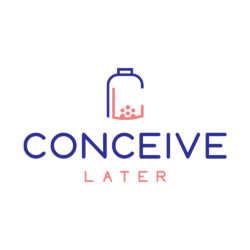Our Conceive Later Egg Freezing program slows the hands of time on a woman’s biological clock

by Isaac Glatstein, MD, MSc
A woman’s biological clock is real and it is steadily ticking away the prospects of pregnancy. It is a well-known fact in reproductive medicine: The quantity and quality of a woman’s eggs decrease as she ages, thus decreasing her fertility potential.
Women’s reproductive systems are designed to fade out of the ability to conceive usually ending around age 44 or 45, with rare exceptions. This is due to follicular atresia, which is the process of ovarian follicles failing to develop, preventing ovulation as well as decreasing egg quality seen with aging. That’s the real biological clock for women.
A way to suspend naturally decreasing fertility
The American College of Obstetricians and Gynecologists notes that for healthy couples in their 20s or early 30s, 1 in 4 women will conceive during a monthly cycle. That rate drops to 1 in 10 women by age 40. By age 45 a woman’s chance of natural pregnancy is unlikely.
The chance of live birth after age 35 decreases significantly due to the increased risk for aneuploidy (the incorrect number of chromosomes in a pair) and miscarriage. Genetic abnormalities are the underlying reason for most age-related fertility decline.
What is the best age to freeze eggs?
We recommend freezing your eggs at a younger age. Your late 20s or early 30s is the most productive time to conceive. It is also the best age for freezing eggs because when you’re ready to conceive later, at a time of your choosing, you’ll be using your healthier eggs from your prime reproductive years. If you’re diagnosed with a condition that can decrease egg quality and quantity, you may want to freeze eggs as soon as possible.
Who should consider freezing eggs to conceive later?
Egg freezing allows individuals and couples to delay parenthood. Reasons can vary and include the following.
Social reasons
A growing number of women want to focus on their careers while they are younger and just starting out, especially in highly competitive jobs. Consider that for the first time ever, more college educated women are in the workforce than college educated men.
Women may want to focus on their education at the younger stage of their life. Graduate studies, advanced professional degrees and unique educational opportunities can take years to complete.
Not finding a suitable partner is a valid and increasing reason for women to freeze their eggs. A Pew Research Center survey notes that in 2019 38% of adults age 25-54 were unpartnered, a 29% increase since 1990.
Women may also choose to focus on additional goals and hobbies before starting a family such as travel, sports or personal growth.
Medical reasons
Certain medical conditions can lead to a woman’s fertility becoming impaired. Egg freezing at an early age can enable women with such issues to have a child later. This is particularly true for those undergoing medical therapies or cancer treatments that can reduce fertility potential. Chemo, radiation, certain medications and surgeries, especially for endometriosis, can all contribute to infertility.
In addition, transmasculine persons have the option of freezing eggs before undertaking gender affirming care that can harm or end fertility. The frozen eggs can be used in in vitro fertilization (IVF) with a partner to achieve a family.
Our Conceive Later program is in sync with the egg freezing boom
In 2012, the American Society for Reproductive Medicine declared that egg freezing was available for widespread use, as the technology and outcomes had improved since first being used in the 1980s. The practice began to grow – then it really took off, with egg freezing cycles jumping 300% from 2015 to 2022, with nearly 30,000 cycles performed that year.
The timing for the Conceive Later Egg Freezing program could not be better, because that growth continues.
Dr. Isaac Glatstein’s egg freezing expertise
- Dr. Glatstein is highly credentialed, including completing a fellowship in reproductive endocrinology and infertility (REI) at Harvard Medical School/Brigham and Women’s Hospital, as well as having received a Fulbright Research Fellowship.
- He earned a Master of Science in Biotechnology of Human Reproduction and Embryology “with distinction,” which gives him exceptional perspective in solving his patients’ reproductive issues. There are only a handful of fertility specialists with this unique expertise.
- Dr. Glatstein has a special interest in egg freezing and other aspects of fertility preservation.
- Conceive NJ’s cutting-edge IVF lab is state-of-the art and equipped with the latest technology, giving patients the edge they need to succeed with an experienced staff.
Employers increasingly pay for slowing the biological clock
One reason for this ongoing growth is that more employers are offering benefits that cover egg freezing, up from about 5% in 2015 to about 20% in 2023. This often happened as a recruitment inducement and because women advocated their employers to provide this benefit to extend their range of motherhood while they focused on their careers.
Today’s generation is the first to have corporate benefits to slow the biological clock. But it’s not just those with insurance benefits selecting egg freezing. More and more women are turning to the process, and they are doing so at younger ages, which is exactly the best time to freeze eggs so you can conceive later.
Egg freezing starts with preparing your body to produce multiple eggs for retrieval, which involves self-injecting fertility medications. These are often referred to as “shot nights,” in part to add a little fun to the 8-12 nights of shots before retrieval. Egg freezing is also normalized on social media, with women sharing their experiences and influencers showcasing it on Instagram and other platforms.
Conceive Later holds the line on the cost of freezing eggs
With increasing popularity – and increasing lab and medical costs across the board – egg freezing prices are also going up. That’s where our Conceive Later Egg Freezing program can really help. Our prices are far less than those in New York and less than most other clinics in New Jersey.
Part of Conceive NJ’s mission is to offer patients fair, affordable pricing on all services and procedures. We think this is particularly important in the field of egg freezing, and our philosophy is that it should be affordable to those who need or want it.
How much does it cost to freeze eggs?
This is a common question we can answer once we know all about the specific patient’s benefits and insurance coverage, as well as assessing any medication discounts we can assist the patient in obtaining. The average price of egg freezing in New Jersey is now at $17,550. We offer egg freezing services starting at $5,000 (or starting at $6,500 if insurance does not cover monitoring fees). This includes monitoring with labs and ultrasound, physician cycle management, nursing instruction and support, egg retrieval and egg freezing.
It is important to note that these starting prices can increase for many reasons including if a patient’s treatment plan requires third-party services such as medications and anesthesia. It also does not include annual egg storage fees. A consultation and testing must be completed before we are able to provide a personalized quote. Fertility financing may also be available through third-party organizations for those who qualify.
How we keep the cost of egg freezing down
- Our lab services and in-house bloodwork are more affordable than other clinics’ costs.
- We built our state-of-the-art clinic to accommodate egg freezing, anticipating the growing demand for the fertility preservation procedures.
- We will explain the full breakdown of egg freezing and egg storing costs with each patient. We can help you understand your insurance benefits and the coverages mandated by the state of New Jersey for fertility treatments in employer healthcare plans, including some aspects of egg freezing.
- Conceive NJ works with pharmacies to offer fertility medication discounts.
- We have aggressively negotiated discounts on behalf of our patients for third-party anesthesia service.
In conclusion
The quantity and quality of a woman’s eggs decrease as she ages, thus decreasing her fertility potential. We recommend freezing eggs in your late 20s or early 30s, as that is the most productive time to conceive.
And when you are ready to start a family, you will be using the healthier eggs from your prime reproductive years. There are many reasons to delay family including focusing on career, education, personal goals or not finding the right partner yet.
Our Conceive Later Egg Freezing program is designed to meet the needs of those people, utilizing the best fertility preservation expertise and advanced laboratory services. We increase chances of success while aggressively working to make egg freezing costs affordable.

Conceive Later – When You’re Ready
Our Conceive Later Egg Freezing program helps women preserve their fertility for later pregnancy at our high-tech fertility center – offering the highest quality egg freezing program at an affordable rate.
